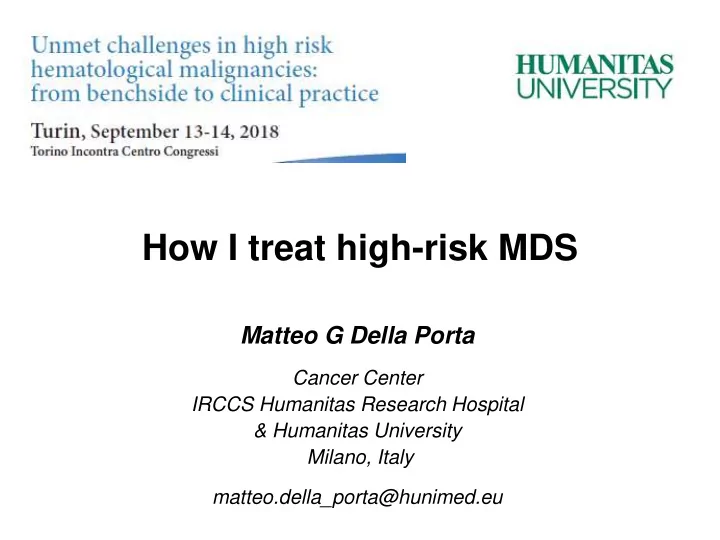

How I treat high-risk MDS Matteo G Della Porta Cancer Center IRCCS Humanitas Research Hospital & Humanitas University Milano, Italy matteo.della_porta@hunimed.eu
Clinical decision making in MDS - Critical issues • How we can define HIGH-RISK MDS?
International Prognostic Scoring System (IPSS) for MDS Variable 0 0.5 1 1.5 2 BM blasts % <5 5-10 - 11-20 21-30 Karyotype* Good Intermediate Poor Cytopenias ° 0/1 2/3 * Good : normal, -Y, del(5q), del(20q); Poor : complex, chromosome 7 anomalies; Intermediate : other abnormalities. ° Hemoglobin < 10 g/dL, absolute neutrophil count < 1,500/µL, platelet count < 100,000/µL. Scores for risk groups are as follows : Low, 0; INT-1, 0.5-1.0; INT-2, 1.5-2.0; and High, 2. Greenberg P et al. Blood 1997;89:2079-2088 Alessandrino P et al. Blood 2008;112:895-902
Kaplan-Meier analysis of survival and cumulative incidence of relapse following allogeneic HSCT in MDS patients stratified according to IPSS or IPSS-R risk. Della Porta MG et al. Blood 2014;123:2333-2342 Della Porta MG et al. Leukemia. 2015 ;29:1502-13.
ASH 2017 - Somatic Mutations in MDS Predict Prognosis Independent of the IPSS-R (Analysis by IWG-PM)
Transplantation decision making in MDS - Critical issues • Which tools are available for transplant decision making? • How we can define optimal timing of transplantation in individual patient? • What is the clinical relevance of somatic mutations in transplantation decision making in MDS?
Transplantation strategy according to IPSS Cutler CS et al. Blood 2004;104(2):579-85.
Transplantation policy according to IPSS-R Patient AGE delay time 40 50-55 >60 (months) 0 16.4 16.1 15.1 Years of life expectancy 12 17.3 16.8 15.4 under policy 1: 24 17.9 17.3 15.6 IPSS-R 48 18.5 17.7 15.7 Low 60 18.7 17.9 15.7 Optimal timing of alloSCT 0 19.3 18.1 15.9 Years of life gain of life expectancy: 12 17.9 17.1 14.9 expectancy - 5.3 y pts <50y under policy 2: 24 17.1 16.4 14.5 - 4.7 y pts 60 y IPSS-R 48 16.3 15.7 14.2 - 2.8 y pts 65 y intermediate 60 16.0 15.5 13.9 Della Porta MG et al. Leukemia. 2017 Apr 7. doi: 10.1038/leu.2017.88
Transplantation policy according to IPSS vs. IPSS-R IPSS-based IPSS-R based IPSS-R % policy* policy ** Very low 37 Delayed Low 50 Delayed IPSS Delayed Intermediate 13 Immediate Low High - Very low / Low 48 Delayed Intermediate 40 Immediate IPSS Delayed Intermediate-1 High 11 Immediate Very high 1 immediate * Cutler CS et al. Blood 2004;104(2):579-85. ** Della Porta MG et al. Leukemia. 2017 Apr 7. doi: 10.1038/leu.2017.88
Transplantation decision making in MDS - Critical issues • What is the clinical relevance of somatic mutations in transplantation decision making in MDS?
Somatic Mutations Predict Poor Outcome in Patients With MDS After Hematopoietic Stem-Cell Transplantation Bejar R et al. J Clin Oncol 2014;32:2691-2698.
Mutation patterns observed in MDS treated with allo-HSCT RUNX1 23% SRSF2 17% ASXL1 17% SF3B1 16% KRAS/NRAS 16% DNMT3A 15% TP53 13% TET2 10% Matteo G. Della Porta et al. JCO doi:10.1200/JCO.2016.67.3616
Relationship between type of oncogenic mutations and overall survival of MDS receiving allo-HSCT Multivariable analysis MDS patients Probability of relapse Overall Survival Variable HR P HR P ASXL1 1.89 .003 1.72 .008 RUNX1 1.67 .02 1.59 .035 TP53 1.90 .019 1.82 .022 Matteo G. Della Porta et al. JCO doi:10.1200/JCO.2016.67.3616
Clinical Impact of Somatic Mutations in Patients With MDS Receiving HSCT, Stratified According to IPSS-R Matteo G. Della Porta et al. JCO doi:10.1200/JCO.2016.67.3616
Mutation Pattern at Disease Relapse After HSCT in Patients With MDS and MDS/AML Matteo G. Della Porta et al. JCO doi:10.1200/JCO.2016.67.3616
Mutation Clearance after Transplantation for Myelodysplastic Syndrome N Engl J Med 2018;379:1028-41.
Prognostic Mutations in Myelodysplastic Syndrome after Stem-Cell Transplantation TP53 RAS pathway JAK2 Lindsley, RC et al. N Engl J Med 2017;376:536-47.
Prognostic Mutations in Myelodysplastic Syndrome after Stem-Cell Transplantation Clinical impact of RAS pathway mutations limited to MDS/MPN Yoshizato et al et al. Blood 2017; in press
TP53 and Decitabine in Acute Myeloid Leukemia and Myelodysplastic Syndromes Welch JS et al. N Engl J Med 2016;375:2023-36.
Genotype-based transplant strategy in MDS GOOD 675 MDS patients PROGNOSIS TP53 mutation No TP53 mutation POOR PROGNOSIS RUNX1 No RUNX1 Splicing Factors other than SF3B1 SF3B1 5q - None of these molecular markers Partitioning analysis by (30% of whole Italian MDS network population)
SUMMARY • The implementation of IPSS-R is expected to result in a more effective prognostic assessment among patients with early disease stage • Mutation screening provides relevant prognostic information at individual patient level • According to a IPSSR-based transplantation strategy, maximal life expectancy was obtained when delaying allo- HSCT after progression to the intermediate risk score. • Mutation screening may affect clinical decision making in transplantation (TP53 mutations are associated to a high probability of disease relapse)
Acknowledgments Marianna Rossi Andrea Bacigalupo Chiara Milanesi Fabio Ciceri Nicla Manes Emanuele Angelucci Matteo Zampini Francesca Bonifazi Elena Saba Alessandro Rambaldi Lucio Morabito All GITMO centers Marta Ubezio Armando Santoro Valeria Santini Francesco Passamonti All FISMcenters
Recommend
More recommend